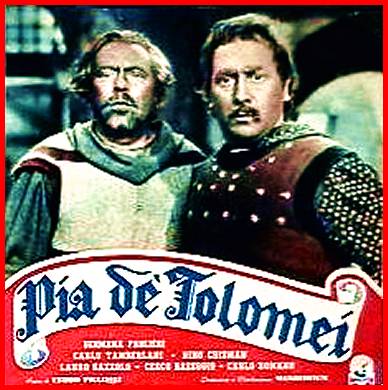|
|
| Sei in: Cinema e Medioevo ® Indice alfabetico dei film |
PIA DEI TOLOMEI
1941, regia di Esodo Pratelli

Scheda: Nazione: Italia - Produzione: Manderfilm - Distribuzione: Manderfilm - Soggetto (dall'episodio della Divina Commedia di Dante Alighieri): Luigi Bonelli - Sceneggiatura: Luigi Pratelli, Guglielmo Usellini - Fotografia: Arturo Gallea - Scenografie: Virgilio Marchi - Musiche: Francesco Mander - Formato: B.N. - Durata: 78'.
Cast: Cesco Baseggio, Nino Crisman, Gemma D'Alba, Germana Paolieri, Daniella Drei, Lauro Gazzolo, Carlo Tamberlani, Emilio Baldanello, Luigi A. Garrone, Alma Guerrini, Achille Majeroni, Antonio Marietti, Dina Perbellini, Michele Riccardini, Carlo Romano, Nando Tamberlani, Amedeo Trilli, Saro Urzì.


![]() «Accusata ingiustamente di adulterio, Pia viene rinchiusa dal marito nella torre di un castello della campagna maremmana, da dove precipiterà, cercando volontariamente la morte, per sfuggire a colui che l’ha accusata e che l’ha raggiunta nella sua prigione»
(Vito
Attolini).
«Accusata ingiustamente di adulterio, Pia viene rinchiusa dal marito nella torre di un castello della campagna maremmana, da dove precipiterà, cercando volontariamente la morte, per sfuggire a colui che l’ha accusata e che l’ha raggiunta nella sua prigione»
(Vito
Attolini).
![]() Vedi anche:
cinematografo.it
-
mymovies.it
-
film.spettacolo.virgilio.it.
Vedi anche:
cinematografo.it
-
mymovies.it
-
film.spettacolo.virgilio.it.
![]() Plot Summary, Synopsis, Review:
IMDb:
«Poor Pia, a woman from Siena of the Middle Ages, is a long-suffering wife
wrongly accused by a Iago-like friend of her husband's that she has been
unfaithful to him. The villain craves the woman for himself, of course, and had
been rejected in a courtship before Pia's marriage. Locked up in a castle in the
Maremma district of Tuscany, things get worse for her until, in resisting the
advances of her chaser, she is knocked out of the castle window and later dies,
but not before her husband realizes the truth of it all and rushes to her to beg
forgiveness. Much of the action is commented upon by what could be called a
Greek chorus of local peasant women and retainers. Germana Paolieri as Pia pulls
out all the stops and is quite moving in what is essentially a sentimental
weepie. The photography by Arturo Gallea is a plus, with both exteriors and
interiors of the period nicely rendered. Director Esodo Pradelli does a decent
job with the performers. Reference to the sad story of Pia is made by Dante in
his Purgatorio. There she is to spend time among those who died by violence
without last rites. In Canto V she speaks to pilgrim Dante: "...oh speak my name
again with living breath to living memory. Pia am I. Siena gave me birth;
Maremma, death"» (Gerald A. DeLuca, John Ciardi translation).
Plot Summary, Synopsis, Review:
IMDb:
«Poor Pia, a woman from Siena of the Middle Ages, is a long-suffering wife
wrongly accused by a Iago-like friend of her husband's that she has been
unfaithful to him. The villain craves the woman for himself, of course, and had
been rejected in a courtship before Pia's marriage. Locked up in a castle in the
Maremma district of Tuscany, things get worse for her until, in resisting the
advances of her chaser, she is knocked out of the castle window and later dies,
but not before her husband realizes the truth of it all and rushes to her to beg
forgiveness. Much of the action is commented upon by what could be called a
Greek chorus of local peasant women and retainers. Germana Paolieri as Pia pulls
out all the stops and is quite moving in what is essentially a sentimental
weepie. The photography by Arturo Gallea is a plus, with both exteriors and
interiors of the period nicely rendered. Director Esodo Pradelli does a decent
job with the performers. Reference to the sad story of Pia is made by Dante in
his Purgatorio. There she is to spend time among those who died by violence
without last rites. In Canto V she speaks to pilgrim Dante: "...oh speak my name
again with living breath to living memory. Pia am I. Siena gave me birth;
Maremma, death"» (Gerald A. DeLuca, John Ciardi translation).
Conosciuto anche con il titolo: Pia of Ptolomey.